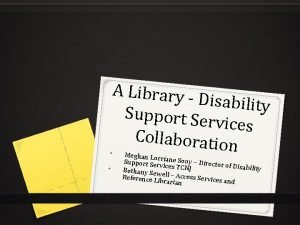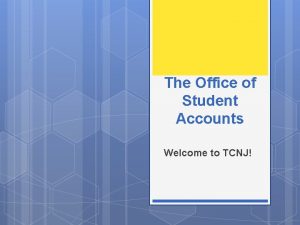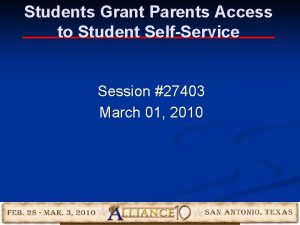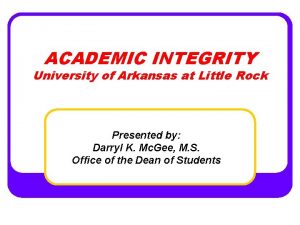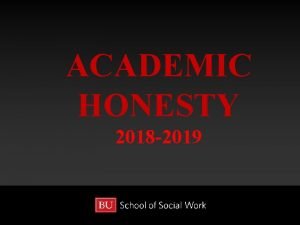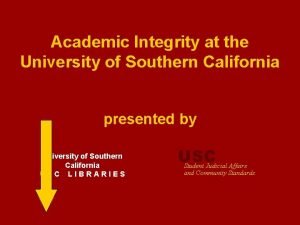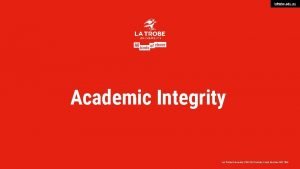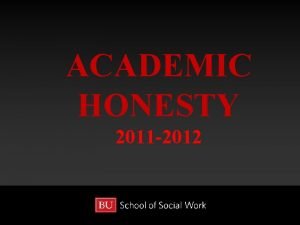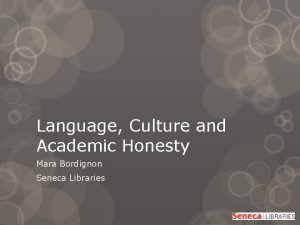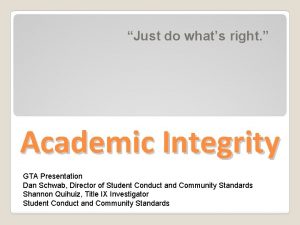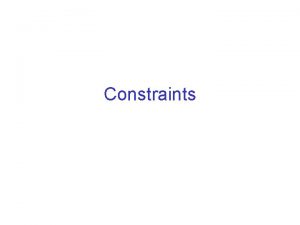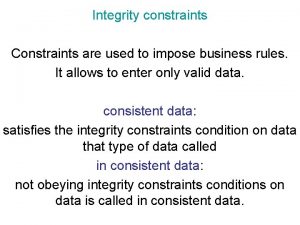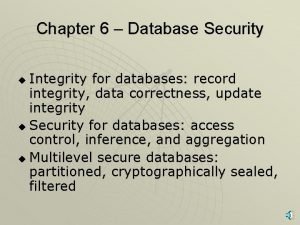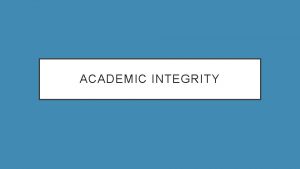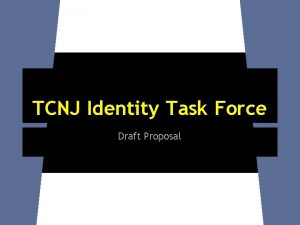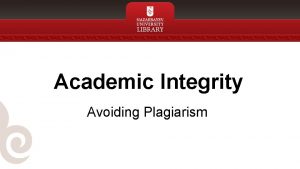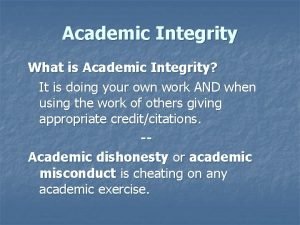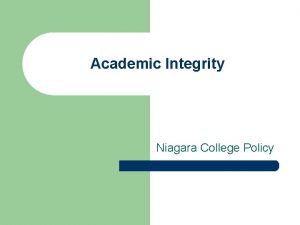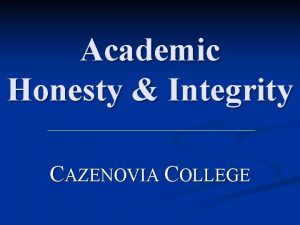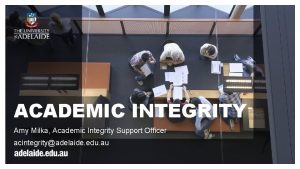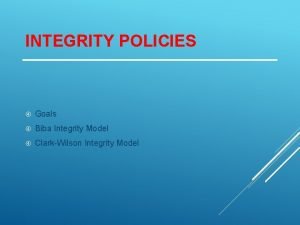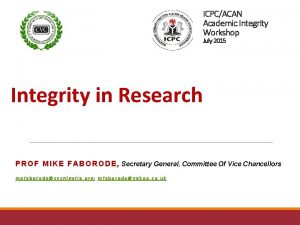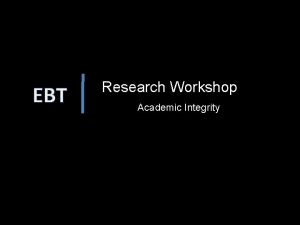Academic Integrity at TCNJ What Is TCNJs Academic


















- Slides: 18

Academic Integrity at TCNJ

What Is TCNJ’s Academic Integrity Policy? Through your FSP you are receiving a brochure about the college’s academic integrity policy and the consequence for violating it. Keep it and read it carefully. This presentation seeks to explain some of the details of the policy.

Does Academic Integrity Matter? n n n Student Perspective: “What does all my hard work matter if someone else cheats and gets away with it? ” Faculty Perspective: “How can I teach effectively if I can’t trust my students to do their own work? ” Everyone’s Perspective: “What kind of school do we want TCNJ to be? A school of cheaters or a community of scholars? ”

Common Violations n n n n Submitting work that is not your own whether through plagiarism (not properly acknowledging the words, ideas, data, etc. of others), purchase, or using another person’s work Cheating on an exam Collaborating when instructions called for independent work Submitting an assignment with falsified or fabricated data or results Submitting the same assignment in multiple classes Feigning illness or personal circumstances to avoid a required academic activity Concealing, destroying, or stealing research or library materials to deprive others of their use or sabotaging someone else's work

When Is Something Dishonest? Bottom line: Would you be willing to tell the professor what you did?

Why Might a Student Behave Dishonestly? n n n Desperation: For example, a student has been under pressure at school and home. Several assignments are due at the same time, and there isn’t time to complete everything. So, the student copies a paper from a web site. Shortcuts: For example, a student decides to use falsified bibliographic entries in a paper for a class outside her major under the belief that this class isn’t as important as those in her major. Lack of understanding: For example, a student isn’t intending to be dishonest, but doesn’t realize that copying material from a website and pasting it into a paper or presentation without citation or attribution is academically dishonest.

How To Avoid Violations n n Ask about your professor’s policies for collaborating, use of sources, etc. Talk to your professor if you have academic problems or need an extension. Good planning can prevent many problems from ever happening. For proper use of sources, get help such as: n n n “Links” tutorial on the library’s website http: //www. tcnj. edu/~liblinks Help at the tutoring center Turnitin, a service that searches Internet and a database of over 40 million student papers to help you or your professor tell if you are relying too heavily a source.

Case Studies Some of these cases may have clear-cut answers; some may depend upon circumstances in a specific class; but all of the cases are worth discussing to get a better idea about academic integrity issues.

Academic Integrity Case #1 Jane writes a paper for an Introduction to Management course on the topic of “Flexible Workplace Benefits in a Diverse Workforce. ” The following year, in a class on Benefits and Compensation, she submits the same paper. Has she behaved dishonestly?

Academic Integrity Case #2 Jeff is writing a paper for a political science class. He needs to describe the workings of the British parliamentary system. He has a source that explains the system very concisely and well. He can’t think of a better way to summarize the system, so he uses some of the exact phrases of the source interspersed among his own words. He cites the source at the end of the paragraph. Has he behaved dishonestly?

Academic Integrity Case #3 Isaac was working on a group project with three other students. Each student was required to complete a fair share, 25%, of the work. Isaac completed about 10% of the total project. Has he behaved dishonestly? Does the answer change if Isaac only contributes 0%?

Academic Integrity Case #4 Sarah and Peter were lab partners in a chemistry class. One week they split the 30 homework problems in half. Sarah did the odd numbers and Peter did the even numbers. They met Sunday night to share the answers. On Monday, Sarah and Peter individually submitted the completed 30 problems. Have they behaved dishonestly?

Academic Integrity Case #5 Sylvia is writing a paper for her economics class. She finishes the paper a couple days before its due date and sends a copy to her mother by email. Her mother edits the paper to fix the grammar, spelling, and typos and then sends it back to Sylvia by email. Sylvia turns in the copy edited by her mother. Has Sylvia behaved dishonestly?

Academic Integrity Case #6 Arnold hasn’t finished his reading for history class. The professor sometimes asks students questions point-blank about the reading, and Arnold doesn’t want to risk not being able to answer something. So, he emails the professor to say that he’s feeling sick and skips class. Has he behaved dishonestly?

Other Academic Integrity Cases n n What kinds of hard-to-judge cases can you imagine? Do you have a question about a specific case you know about or can imagine?

What Happens in Academic Integrity Cases? n n Academic integrity cases may be decided by an Academic Integrity Officer in a School, the Chief Academic Integrity Officer, or the All-College Academic Integrity Board. The result of academic integrity cases may include: n Being cleared of any wrongdoing n Redoing the assignment in question n Receiving an F for the assignment n Receiving an F for the course n Receiving a Disciplinary F (which permanently counts in the GPA) n Being suspended or dismissed from TCNJ.

Academic Integrity Procedure. n n Reports of possible academic integrity violations are submitted to the Office of Academic Affairs, which refers the complaint to the Academic Integrity Officer (AIO) of the appropriate School or Program. The AIO may conduct a hearing with the student or refer the student’s case to the All College Academic Integrity Board (ACAIB) for a hearing. The AIO must refer the case to the ACAIB whenever suspension or expulsion are possible sanctions. The AIO may also assign a case to an AIO in another school if any conflicts or extraordinary scheduling issues exist.

AIO Hearing Procedures § The AIO investigates the complaint and determines whethere is a violation of academic integrity. § If the student is found not responsible for violating the Academic Integrity Policy, the process is concluded. If the student is found responsible, the AIO will then assign any appropriate sanctions. § The student charged may appeal the decision and/or any sanctions issued by the AIO.
 Tcnj academic integrity
Tcnj academic integrity Tcnj disability services
Tcnj disability services Student accounts tcnj
Student accounts tcnj Tcnj oracle
Tcnj oracle Tcnj ccs
Tcnj ccs University of arkansas academic integrity
University of arkansas academic integrity 5 pillars of academic integrity
5 pillars of academic integrity Six fundamental values of academic integrity
Six fundamental values of academic integrity Usc academic integrity
Usc academic integrity Studiosity latrobe
Studiosity latrobe Five fundamental values of academic integrity
Five fundamental values of academic integrity Academic integrity seneca
Academic integrity seneca Whats academic integrity
Whats academic integrity Celebrities with integrity
Celebrities with integrity Violated - parent key not found
Violated - parent key not found Domain integrity example
Domain integrity example Data integrity constraints are used to
Data integrity constraints are used to Uintegrity
Uintegrity Integrity and professionalism
Integrity and professionalism

